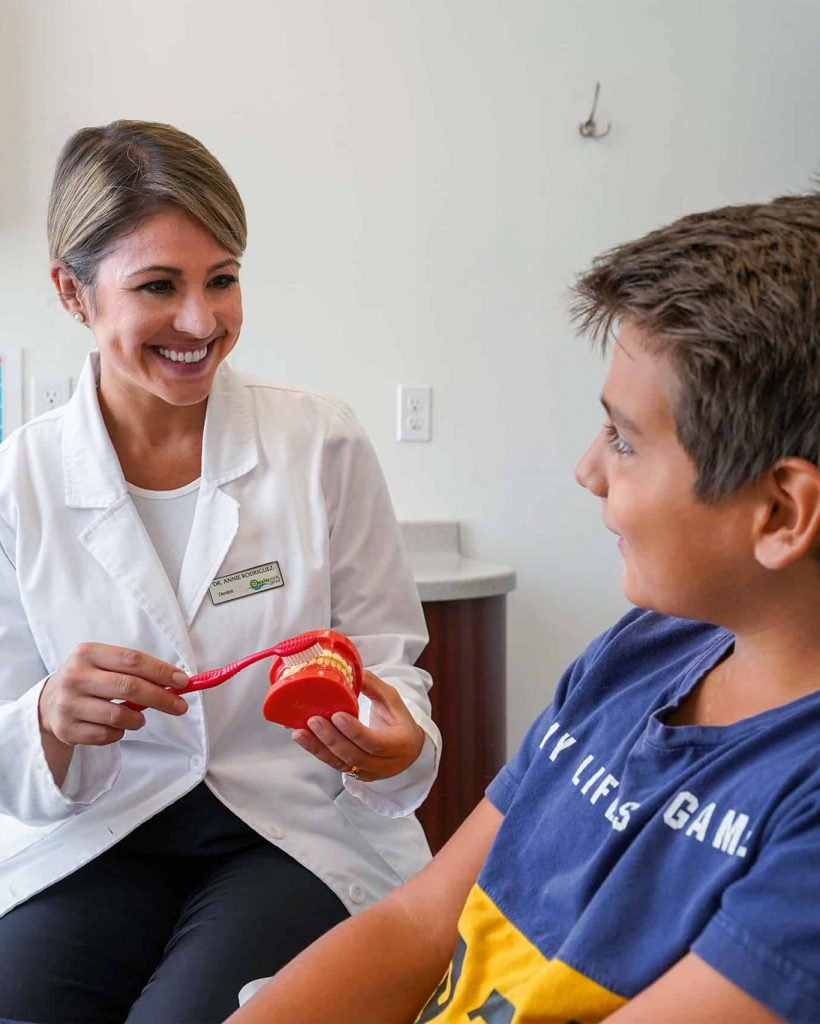Newmarket Teen (12-18 Years Old) Dental Services
- Home
- Services
- Children's Dentistry
- Teens 12-18 Years Old
Supporting Healthy Teeth Through the Teenage Years
Confident Smiles for Teens: Expert Dental Care for Ages 12-18
As teens become more independent, their oral health habits play a crucial role in their long-term dental wellness. From cavity prevention to orthodontic care, regular check-ups and personalized treatments help teens maintain strong, healthy smiles. Our team provides the guidance and support needed to encourage lifelong oral hygiene while addressing any emerging dental concerns.

Orthodontics
Orthodontic treatment helps correct misaligned teeth and bite issues, improving both the function and appearance of your smile. Whether using traditional braces or clear aligners, orthodontics can enhance oral health, prevent future dental issues, and give a straighter, more confident smile.

Extractions, Wisdom Teeth & Surgery
In some cases, emergency dental procedures such as extractions or wisdom teeth removal are necessary to relieve pain or prevent serious complications. Whether you need a simple tooth extraction or a more complex wisdom tooth removal, our skilled team can provide.

Oral Appliances
Oral appliances are custom-made devices designed to address various dental concerns, from preventing teeth grinding and snoring to treating sleep apnea and TMJ disorders. These comfortable, non-invasive solutions help protect your teeth and enhance your overall well-being.

Teeth Cleaning
Regular teeth cleaning is an essential part of maintaining a healthy mouth. During a teeth cleaning, we remove plaque and tartar buildup, polish your teeth, and leave your smile looking fresh.

White Fillings
If you experience a dental emergency due to a cavity or damaged filling, we offer fast and reliable filling services. Our team will assess the damage, clean the affected area, and restore your tooth with a durable filling material.
Book Your Appointment Today
Monday: 9 AM–5 PM Tuesday: 9 AM–5 PM Wednesday: 9 AM–6 PM Thursday: 9 AM–7 PM Friday: 9 AM–2 PM Saturday: 9 AM–2 PM Sunday: Closed
The Oasispark Dental Difference
Why Patients Choose Us
When it comes to your dental care, you deserve a clinic that puts your needs first. At Oasispark Dental, we’re committed to making every visit a positive experience with these key benefits.
Compassionate Patient Care
Cutting-Edge Technology
Flexible Scheduling Options
Comprehensive Dental Services
Book Your Appointment With Oasispark Dental
Don’t wait to achieve the smile you’ve always wanted. Contact Oasispark Dental to schedule your appointment and experience compassionate, expert care.
Testimonials
What Our Patients Say About Us
Trustindex verifies that the original source of the review is Google. Never been disappointed. Always inviting, professional, clean, and very calm atmosphere. Offer direct claims/billing with your insurance.Trustindex verifies that the original source of the review is Google. Great service and excellent staff!Trustindex verifies that the original source of the review is Google. Service was on time, as scheduled. The place is very clean and peaceful. The team is professional, carrying and trustworthy. Would highly recommend this place!Trustindex verifies that the original source of the review is Google. I'm so happy I made the switch to Oasispark Dental as I was not impressed with the lack of interest from my former dental office. Dr. Annie and all of the staff are warm, friendly and efficient. I had a couple of minor issues of concern and they explained the necessary treatments and the potential costs, so I could make an informed decision. Meghan gave my teeth the best cleaning they've ever had! I'm so relieved to have found a dental practice that I have confidence in and would definitely recommend their services to anyone looking for quality dental care!Trustindex verifies that the original source of the review is Google. Oasispark Dental is the best dental office I’ve ever been to. All the staff are incredibly friendly and considerate. Dr Annie is amazing as well as my hygienist Meghan. Couldn’t be happier with this team!Trustindex verifies that the original source of the review is Google. I’ve had nothing but great experiences here. The staff is wonderfulTrustindex verifies that the original source of the review is Google. BEST DENTAL OFFICE EVER!!!!!!!!!! No seriously, great staff, super friendly, and they pay attention to all of my concerns and attend to them. I have some dental anxiety and the staff was super great in explaining and easing my concerns. I could not recommend this office enough.Trustindex verifies that the original source of the review is Google. I just had a great visit at Oasispark Dental for a cleaning and a filling. The staff were super friendly and welcoming. The hygienist was gentle, and the dentist explained the filling procedure clearly and ensured I was comfortable throughout. The entire visit was smooth and painless. This practice has an excellent care and professionalism, highly recommended for their amazing service.
Everything You Need To Know About Your Dental Care
Frequently Asked Questions
At Oasispark Dental, we understand that you may have questions about your oral health and the dental services we provide. That’s why we’ve compiled answers to some of the most common questions we receive. If you don’t see your question here, feel free to reach out to our team—we’re always happy to help!
Teens should see a dentist at least twice a year for check-ups and cleanings. If they have braces or other orthodontic appliances, more frequent visits may be necessary.
Encourage good habits like brushing twice daily, flossing, and limiting sugary drinks and snacks. Keeping a travel toothbrush in their backpack can help maintain oral hygiene on the go.
Teens experiencing jaw pain, headaches, or grinding at night may benefit from a night guard or further evaluation for TMJ issues. A dentist can provide the right solutions to protect their teeth and relieve discomfort.
Not always! If wisdom teeth grow in properly and don’t cause crowding or pain, they may not need extraction. However, regular dental check-ups will help determine if removal is necessary.


